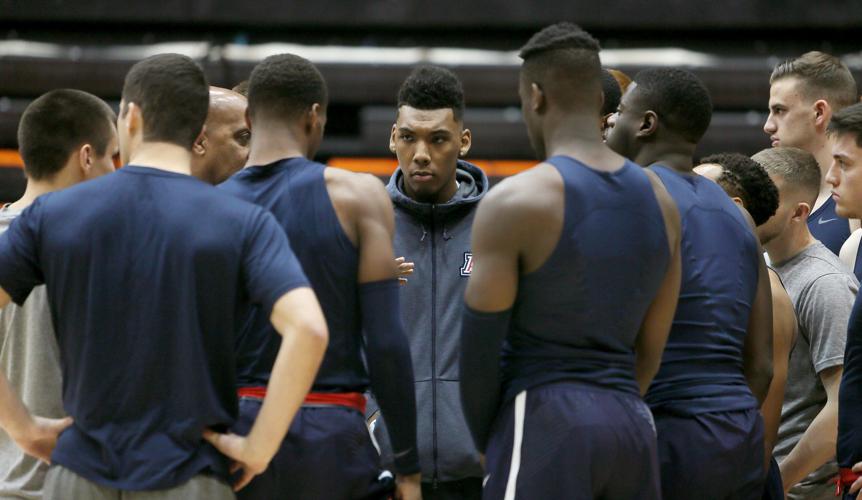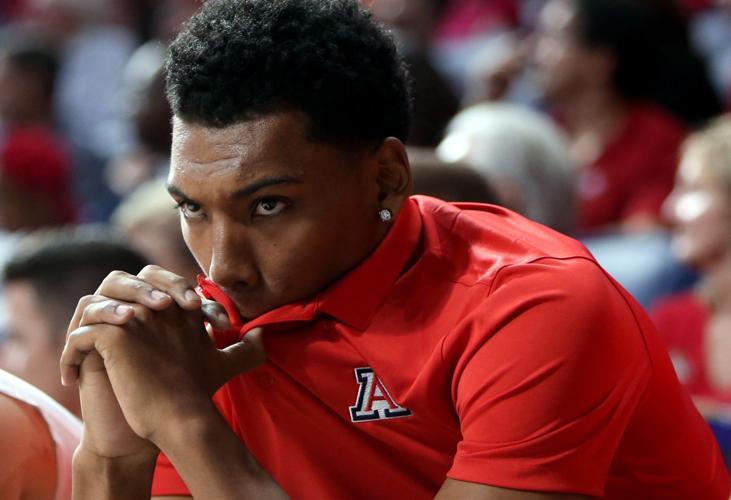The NCAA ruled Arizona Wildcats guard Allonzo Trier ineligible Thursday after he tested positive again for trace amounts of Ostarine, a banned performance-enhancing drug, near the end of last month.
The star junior had been tested multiple times since returning from last year's suspension as a result of a positive test for the same PED, according to Trier's attorney Steve Thompson via Pat Forde of Yahoo Sports.
Trier originally tested positive in September 2016 after he inadvertently ingested Ostarine in a drink his stepfather had made, Thompson said.
"The NCAA's intransigence on this issue is mind-boggling," Thompson said. "Allonzo has never been a drug-cheat, and the NCAA found in 2016 that he never took Ostarine intentionally. The experts tell us Ostarine can be stored in fatty tissues for a long time, and tests can be negative but then later be positive as the substance comes out."
Thompson said the university requested a medical exception from the NCAA so Trier could continue playing, but that it was rejected Thursday before Trier was ruled ineligible.
The UA issued a statement Thursday afternoon saying that a "minuscule" amount of what appeared to be the same banned substance that sidelined Trier last season reappeared in a test taken last month. Trier missed 19 games last season after he tested positive in the preseason, and wasn't cleared until testing clear of the unnamed substance in mid-January.
Trier will not be available on Thursday when the 14th-ranked Wildcats play at Oregon State, but UA said it was hopeful Trier would regain his eligibility soon.
"The results of that test, confirmed today, revealed the reappearance of a trace amount of a banned substance," the UA's statement said. "The amount detected was minuscule by scientific standards and appears to be a remnant of a substance, which the NCAA agreed, Allonzo had unknowingly ingested in 2016. The University is appealing the decision and is hopeful that Allonzo will regain his eligibility soon."
Arizona would not confirm the reason for Trier's absence for the first 18 games of his 19-game suspension last season, but in a Jan. 18, 2017 announcement, Trier said he was "shocked" that he tested positive for the substance.
He was involved in a serious car crash during the offseason of 2016, the details of which Trier said last March that he didn't "really want to get into," and took the unspecified drug as part of his recovery.
“I have never knowingly taken a banned substance,” Trier said in his statement in January 2017. “After finding out that I was given a banned substance by a well-intentioned, but misguided person not associated with the University after an injury, I presented this information to the NCAA. The NCAA agreed that I had no knowledge of receiving the substance and my eligibility was restored.”
The NCAA ruled then that Trier would be eligible to play again once he passed a drug test, and Trier was tested every 7-10 days during that time, finally being cleared in time to play in Arizona's win at UCLA on Jan. 21, 2017. It's unclear whether the NCAA's same standards would apply following Trier's latest missed test.
Players may face a one-year suspension from competition following a second positive test for performance-enhancing drugs.
After being cleared to return, Trier gradually improved as last season went on and won the Pac-12 Tournament MVP. During that event, he described the frustration of sitting out for reasons that were not public at the time.
"A lot of people don't know what it's like," Trier said. "Everybody was so worried about what the issue is and why I'm out. Nobody really takes a look at what I'm actually going through, what it feels like to be me. I'm hounded every single day. You become so magnified in the media and you're not really a normal person because you're a high-level college basketball athlete. But at that point, I was living in a glass house. Everyone was looking at me.
"You try to stay strong and sometimes, when you're alone, you break down and cry. It's a tough feeling, but you have to stay strong. You have to stay mentally tough. It's something that made me mature a whole lot and it's something you can't prepare for, but I guess it happened for a reason. I'm here now and put it behind me."
Trier has been among the nation's best guards this season, averaging 19.6 points, 3.2 rebounds and 3.2 assists per game with remarkable efficiency. He's shooting 54.1 percent from the field, 43.0 percent from 3-point range and has hit 85.4 percent of his free throws — all career highs.
Trier is second in the Pac-12 in scoring and fourth in 3-point field goal percentage.





